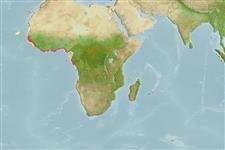Common names from other countries
>
Elopiformes (Tarpons and tenpounders) >
Elopidae (Tenpounders)
Etymology: Elops: Greek, ellops = a kind of serpent (Ref. 45335).
More on author: Regan.
Environment: milieu / climate zone / depth range / distribution range
Ecologia
marinhas; estuarina; intervalo de profundidade ? - 50 m (Ref. 118623). Tropical; 22°N - 7°S, 26°W - 13°E (Ref. 118623)
Eastern Atlantic: West African coast from Mauritania to the Democratic Republic of Congo (Ref. 2844, 4445, 81265). It is often confused with Elops lacerta (Ref. 81265).
Tamanho / Peso / Idade
Maturity: Lm ? range ? - ? cm
Max length : 90.0 cm TL macho/indeterminado; (Ref. 81265); common length : 60.0 cm TL macho/indeterminado; (Ref. 2683); peso máx. publicado: 5.9 kg (Ref. 40637)
Espinhos dorsais (total) : 0; Espinhos anais: 0. Diagnosis: Elops senegalensis is often confused with Elops lacerta, from which it is distinguished by a smaller number of gill-rakers on the lower limb of the first gill arch, being 11-15 vs. 17-19; and a greater number of small scales in the lateral line, 92-100 vs. 72-83 in E. lacerta (Ref. 2844, 81265).
Coastal pelagic species, occurring inshore and some way up the tidal rivers to the edge of the shelf (Ref. 4445). Feeds on fish and shrimps (Ref. 28587).
Ciclo de vida ou comportamento de acasalamento
Maturities | Reprodução | Spawnings | Egg(s) | Fecundities | Larvas
Schneider, W., 1990. FAO species identification sheets for fishery purposes. Field guide to the commercial marine resources of the Gulf of Guinea. Prepared and published with the support of the FAO Regional Office for Africa. Rome: FAO. 268 p. (Ref. 2683)
Status na Lista Vermelha da UICN (Ref. 130435)
CITES (Ref. 128078)
Not Evaluated
Ameaça para os humanos
Harmless
Uso pelos humanos
Pescarias: espécies comerciais; peixe esportivo: sim
Ferramentas
Relatórios especiais
Baixar XML
Fontes da internet
Estimates based on models
Preferred temperature (Ref.
115969): 23.8 - 28, mean 26.7 (based on 68 cells).
Índice de diversidade filogenética (Ref.
82804): PD
50 = 0.5176 [Uniqueness, from 0.5 = low to 2.0 = high].
Bayesian length-weight: a=0.00589 (0.00256 - 0.01357), b=2.99 (2.79 - 3.19), in cm Total Length, based on LWR estimates for this (Sub)family-body shape (Ref.
93245).
Nível Trófico (Ref.
69278): 3.6 ±0.60 se; based on food items.
Fishing Vulnerability (Ref.
59153): High vulnerability (56 of 100).
